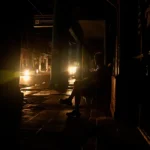
With high inflation and austerity at home, Argentines take advantage of the valued peso abroad, flocking to destinations such as Brazil and Uruguay
The sun was shining and the waves were crashing as Luciano Morei and Gustavo Gavini relaxed and admired the familiar arch of Copacabana Beach.
The friends are from Buenos Aires, but have become regular visitors to the most famous strip of sand in Brazil. Morei was visiting for the second time this year, while Gavini was on his fourth trip. And if Argentina’s economic policy doesn’t change, they will be back soon.
“It’s getting cheaper and cheaper,” said Gavini, 51, sipping another discounted caipirinha.
Argentines are being punished by fiscal austerity and triple-digit inflation at home. But abroad, they are profiting from an artificially strong peso. Top destinations like Brazil and Uruguay have become temptingly cheap for those with Argentine currency, attracting crowds of visitors from across the border.
The flood of tourists is preparing Argentina’s tourism sector for tough times, while business owners and operators in neighboring tourist hotspots are excited about their prospects as the busy season approaches.
Local newspapers are publishing stories highlighting the discounted emotions across the border. Searches for Brazil on travel website Decolar (“Decole”) are increasing, while companies operating ferries between Buenos Aires and Uruguay are reporting that they are already sold out during the Christmas holidays.
Adrian Conde, 51, owner of Pueblo Tannat, a winery and restaurant in Carmelo, Uruguay, says his customers have historically been mainly Brazilians and locals. This year, he is seeing a surge in interest from Argentines, noting that they have purchased nearly half the tickets for his New Year’s Eve celebration, a five-course dinner and party.
Argentines’ new international purchasing power stems from President Javier Milei’s efforts to remedy his nation’s chronically high inflation. In recent years, inflation in Argentina has been accompanied by a weakening peso — at least in unofficial markets. But since implementing a one-time devaluation in late 2023, Milei has kept the value of the peso relative to the dollar stable, in part by applying exchange controls.
While prices and wages have risen more than 110% so far this year, the currency has fallen just 21%, increasing wages in dollar terms and making Argentina much more expensive. This has led deal hunters to embark on shopping missions to far-flung places like Chile and Miami. And as the South American summer begins, the distortion is fueling longer-term travel plans.
Uruguay, known as one of the most expensive destinations in the region, has become comparatively cheap for Argentine tourists like Nicolas Gomez. While sunbathing on a beach near Punta Del Este with his family, he said he monitored prices when visiting the same beach town last year.
“My daughters would ask for ice cream and it was painful,” Gomez recalled. On this trip, the 37-year-old gym owner was shocked to discover that beers cost practically the same or less than in Argentina. “I don’t bother asking for a second one,” he said.
But Argentines are getting the maximum return on their investments in Brazil. The peso rose to its highest level against the Brazilian currency — the real — in a decade this week, as investors worry about struggling public finances under the leftist government of President Luiz Inácio Lula da Silva.
Gomez’s family is embracing currency fluctuations and booked their Carnival vacation in Florianópolis, a city in southern Brazil known for its white sand beaches. “Brazil is going to be a party,” he said.
The party is well underway. Tourism to Brazil from Argentina increased by almost 32% in October, compared to the same month the previous year, according to data from Argentina’s statistics institute, Indec.
Paula Cristi, Decolar’s country manager for Argentina, says the rush is partly due to pent-up demand for international travel, which plummeted during the pandemic. This combined with a years-long economic crisis has made traveling abroad much more difficult.
“We have been a little slower to recover,” she said. “And the destination that recovered the most was Brazil.”
Rio’s international airport is now packed with travelers carrying thermoses and gourds used to drink yerba mate, Argentina’s bitter national drink. Among them was Lourdes Torres, 25, who arrived from Buenos Aires for a 12-day trip of shopping and sun.
Torres was eager to buy electronics and clothing brands that are expensive at home, like Nike. “Really, buying anything right now is worth it,” she said.
Summer migration is also leaving enclaves along Argentina’s Atlantic coast abandoned. There, operators are already registering a drop in visitors.
“The phone isn’t ringing,” said Claudio Jallinsky, 61, owner and operator of Hotel Alfa in Villa Gesell, a resort town southeast of Buenos Aires.
Jallinksy can usually count on 80% occupancy of his 70-room hotel during the summer months. But occupancy for this season? “Nothing”, he lamented, adding that only a third of the rooms were reserved for the period.
It’s not just locals who are choosing not to vacation in Argentina as costs soar. International visitors fell more than 30% in October compared to the same month a year ago, according to Indec. Economists expect the peso’s relative strength to be long-lasting, meaning the slowdown is likely not a hindrance but a routine.
For longtime Brazil enthusiasts like Morei, 51, the Buenos Aires native who was lounging on Copacabana Beach with his friend, the decision to vacation at home or travel abroad was a no-brainer.
“It’s cheaper here, the service is better, the beaches are more beautiful and the water is warmer,” he said. “I didn’t think twice.”
By Andrew Rosati and Kevin Simauchi for Bloomberg*
Source: https://www.ocafezinho.com/2024/12/21/politica-de-milei-faz-argentinos-fugirem-para-o-brasil/

